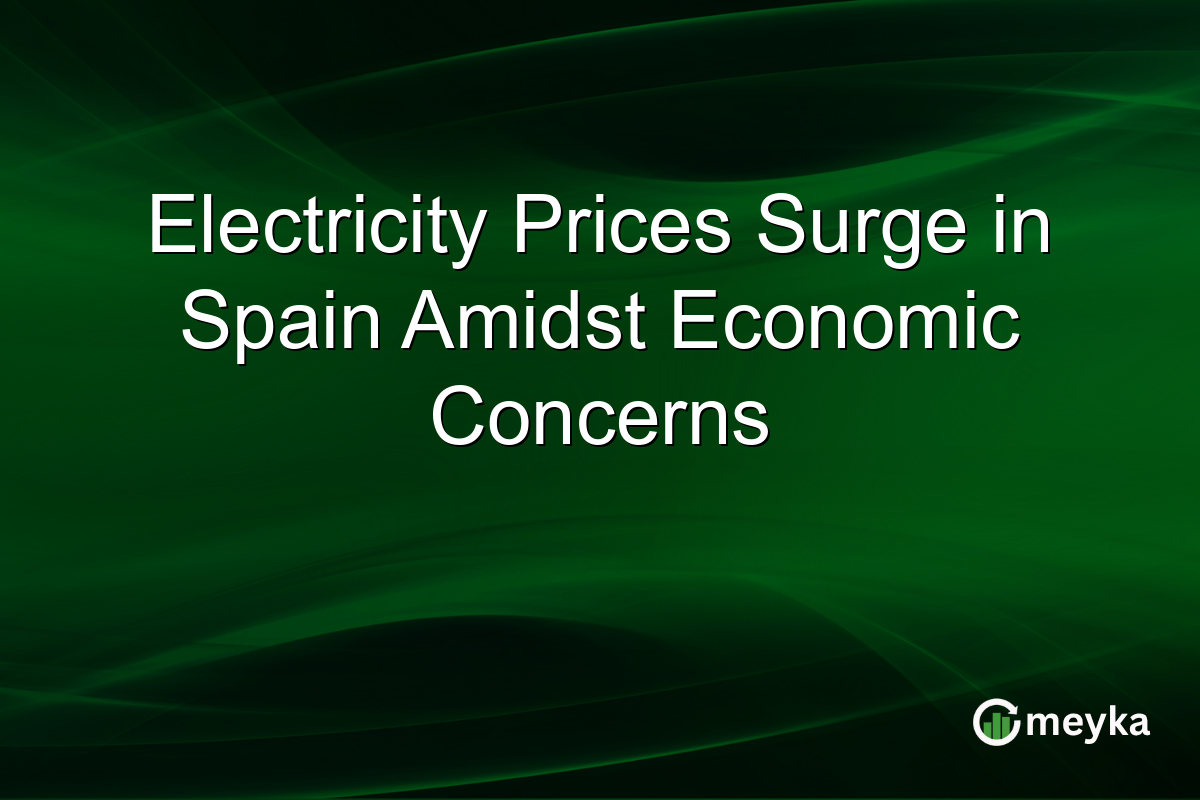Electricity Prices Surge in Spain Amidst Economic Concerns
Electricity prices in Spain have surged by 40% recently, creating significant economic concern across the nation. This sharp increase has alarmed both consumers and businesses, who now face mounting financial pressure. With Spain already navigating various economic challenges, this development could exacerbate existing issues and create further market instability. The rise in electricity prices is indicative of the broader Spain energy crisis, highlighting vulnerabilities in the nation’s energy infrastructure as global tensions loom.
The Driving Factors Behind the Surge
The increase in electricity prices in Spain can be attributed to a combination of factors. Firstly, increased global demand has led to price hikes in natural gas, a critical energy source for electricity production in Spain. Furthermore, geopolitical tensions have exacerbated these pricing pressures, driving up costs at an unprecedented rate. Recent reports from the National Statistics Institute indicate that the reliance on imported energy makes Spain particularly susceptible to such global fluctuations. Thus, as these international factors destabilize, local electricity costs soar.
Impact on Consumers and Businesses
As electricity prices climb, both consumers and businesses are feeling the pinch. Households are experiencing higher utility bills, straining budgets already tight from inflation. Small and medium-sized enterprises, which form the backbone of the Spanish economy, face increased operational costs. Businesses may need to pass on these costs to consumers, potentially leading to higher prices across various sectors. An article from Spanish News Today details local reactions, noting widespread concern about the sustainability of current energy pricing.
Government Response and Initiatives
In response to these rising electricity costs, the Spanish government has introduced measures to mitigate effects on consumers. Policies include subsidies for low-income households and investments in renewable energy to reduce dependence on volatile fossil fuels. Recently, the Spanish Prime Minister announced a strategy aimed at accelerating the transition to solar and wind energy, thereby aiming to lower long-term electricity costs. However, these measures require significant investment and time before substantial relief is felt among Spanish citizens.
Potential Long-term Solutions
Looking ahead, diversifying energy sources appears crucial. Spain’s investment in renewables could set it on a path to energy independence. Encouraging developments in this area include increased funding for technology and infrastructure. Analysts suggest that these initiatives could stabilize Spanish electricity costs, offering a more predictable economic landscape. National energy policy adaptation will play a key role in safeguarding economic stability as external factors continue to influence Spain’s energy crisis.
Final Thoughts
In summary, the recent surge in electricity prices in Spain is a pressing concern affecting various aspects of the economy. With global factors driving up costs, the Spanish government faces challenges in balancing immediate relief and long-term energy strategy. Investment in renewable energy and diversification of sources are vital steps toward achieving greater energy security. For consumers and businesses, navigating this rise will require strategic adaptation to manage expenses effectively. Continued government focus on sustainable energy solutions could eventually mitigate the impact of such price hikes.
FAQs
Electricity prices have surged due to increased global demand, rising natural gas prices, and geopolitical tensions impacting energy imports. These factors have disrupted supply and raised production costs.
Businesses face higher operational costs, which may lead to increased product prices for consumers. Small and medium-sized enterprises, in particular, are under significant financial strain.
The government has introduced subsidies for low-income households and is investing in renewable energy sources like solar and wind. These initiatives aim to reduce reliance on fossil fuels and stabilize costs.
Yes, increasing the share of renewable energy can enhance energy independence and potentially lower electricity prices. The transition to renewables is critical for a sustainable energy future.
If sustained, high electricity prices could strain consumer budgets and business operations, potentially slowing economic growth. Government measures and renewable investments are crucial to mitigating long-term impacts.
Disclaimer:
This is for information only, not financial advice. Always do your research.






